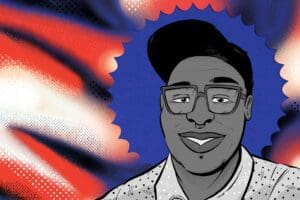Transgender man shares how an abortion saved his life
‘There are plenty of nonbinary [people] and trans men who are also having abortions and who need access and should be included in the conversation,’ Cazembe Murphy Jackson said.

This story is part of a series on the fallout of the U.S. Supreme Court’s ruling in Dobbs v. Jackson Women’s Health Organization that overturned Roe v. Wade and ended the federal constitutional right to abortion.
It’s been nearly a year since the U.S. Supreme Court’s decision in June 2022 to overturn Roe v. Wade. In that time, 14 states have implemented restrictive abortion bans. These bans impact any person who can become pregnant and wants to obtain abortion care.
Cazembe Murphy Jackson is a nonbinary transgender man. He tells the American Independent Foundation that in 2011, when he was a junior in college, he was raped. Six weeks later, he learned he was pregnant. He says his abortion unequivocally saved his life.
Jackson explains that he left college in Huntsville, Texas, to go to a Planned Parenthood clinic in Austin, around the corner from his mother’s house. But as a poor college student, he couldn’t afford the $300 procedure, so he was forced to take out a short-term, high-interest-rate payday loan. Today, abortion medication at Planned Parenthood costs around $600, depending on where the clinic is.
“I really chose Planned Parenthood because, you know, a Black queer kid in the South, there wasn’t a whole lot of safe places to go to, to be able to get an abortion,” Jackson says.
“I say safe — there were multiple, and still are multiple, organizations that would say, you could get an abortion there, but then try to talk you into keeping the baby. Or there will be other people that would be really homophobic,” Jackson added, referring to places known as crisis pregnancy centers that represent themselves as legitimate health care centers but dissuade patients from seeking contraception or abortion care.
Jackson says he was given abortion medication and referred to a rape crisis center in Austin.
“I don’t know what I would have done if I wouldn’t have been able to have an abortion, but I know I wasn’t ready to be a parent — especially not under those circumstances,” Jackson says. “I think it’s worth saying that even though in my situation, the conditions were very egregious, I think any person should be able to have an abortion under any circumstance. I don’t think it just refers to rape or incest or anything like that, but that it’s every person’s right to make a choice for themselves.”
Jackson, who is now 42 and lives in Atlanta, Georgia, is a volunteer storyteller at We Testify, an organization founded in 2016 to support people who’ve had abortions in sharing their stories. According to its website, We Testify’s mission is to “change the conversation about who has an abortion and why, and to address abortion stigma in our communities.”
Jackson says he shares the story of his sexual assault, which he wrote about for Esquire magazine in 2022, just after the fall of Roe, because, as a community organizer, he hopes to shift the narrative that abortion is an issue that solely impacts women.
“There are plenty of nonbinary [people] and trans men who are also having abortions and who need access and should be included in the conversation,” Jackson says. “I do everything that I can to include us in the conversation and really try to get other trans and nonbinary folks to do the same thing. But you know, there’s a stigma around being trans and getting pregnant, still. So there’s not a lot of people that want to talk about it. And until there is, I’ll keep just saying yes because the conversation needs to be had.”
In his Esquire essay, Jackson writes that his grandmother told him, “If they come for you at night, they will come for me in the morning.” It’s a riff on, “For, if they take you in the morning, they will be coming for us that night,” a line originally written by James Baldwin in 1970 in a letter to Angela Davis that Davis published in 1971 in her collection of essays “If They Come in the Morning: Voices of Resistance.” Baldwin was making the point that in order for all people to achieve equality, all must come together to fight for it — as one united front.
Jackson says he’s found many examples of the wisdom in that statement over time.
“You know, abortion was banned, but then [Justice] Clarence Thomas wrote [a concurring opinion to the Dobbs v. Jackson Women’s Health Organization decision, which removed federal legal abortion protections] that he was coming for gay marriage, and also contraceptives or birth control,” he says.
Jackson also applies his grandmother’s wisdom to the numerous anti-trans bills now making their way through state legislatures.
In the last three years, Republican lawmakers have proposed and passed a record number of anti-LGBTQ bills with specific attacks on the transgender community. According to Trans Legislation Tracker, 52 anti-trans bills have been signed into law in 2023. Bans on gender-affirming care for minors have passed in GOP-controlled legislatures in 10 states.
“The drag bills are the most ridiculous to me because what they insinuate is that anybody that is dressed outside of what their gender says on their birth certificate is breaking the law,” Jackson says. “That’s everybody — women wear boyfriend jeans and boyfriend T-shirts every day, that are straight. You put on a T-shirt and some pants and a baseball cap, then you’re in drag in a way, and can be targeted and criminalized for it. And so when I say, ‘If they come from me at night, they’ll come for you in the morning,’ I really mean that. The only people in this country that I believe are safe in this moment are cis straight Christian white men who are rich. And if you’re not all of those things, then you’re in danger.”
Jackson compares abortion rights to abolition:
When I talk about abolition, I mean the ending of the system of policing, not the ending of holding people accountable for doing wrong things, not the ending of people being safe. … When I talk about abolition as an abortion issue, it specifically means that people who are getting abortions are going to be criminalized for getting those abortions, and we don’t want that. Just like we don’t want people being criminalized for other things. And we know that the people who are criminalized for those things are Black people, other Indigenous and people of color, other queer and trans nonbinary folks, and women. Those are the people who are going to be criminalized for these things at the most high rates.
Jackson explains that there’s a difference between reproductive rights and reproductive justice.
Reproductive rights is saying we want to have the right to be able to do with our bodies what we want to do. We want to have an abortion, we want to be able to have an abortion. … Reproductive justice is saying everything that we need in order to be able to make an informed choice about whether or not we want to have a family needs to be provided to us. That includes housing, that includes medicine, that includes food, that includes clothing, that includes, you know, dignity on your job. All of those things inform whether or not you’re able to make a choice about your reproductive future.
When asked what advice he would give to someone today who finds themselves in the same situation he was in over 20 years ago, Jackson says he would tell them that multiple organizations exist to help people.
“I would talk to folks about what their options are and let them know that they weren’t alone in this,” Jackson says. “There’s mad people, or a lot of people, who are organizing around this particular issue to make sure that folks have support if they are in a situation like the situation I was in in 2001.”
He adds that there are also plenty of options for those who may not need or want abortion care but do want to become involved in the movement to support those who do.
“I am an organizer, so that’s always going to be my answer … find organizations in your area that are doing work, that fight systems of oppression, and join,” Jackson says. “If you can’t join for whatever reason, donate to them, volunteer at those organizations, and support them however you can. When it comes to abortion, there are abortion funds in almost every state. So if you’re looking to support abortion rights and access in specific, find the abortion funds.”
Published with permission of The American Independent Foundation.
Recommended

Alaska House committee advances, expands proposal to bar trans girls from girls sports
Amended bill would add elementary, middle school and collegiate sports to limits in place for high school
By Claire Stremple, Alaska Beacon - April 16, 2024
Bills targeting trans people are on the rise nationwide and in Alaska — most focus on children
House committee advances legislation that would restrict the rights of Alaska trans kids
By Claire Stremple, Alaska Beacon - April 01, 2024
Anti-abortion, anti-LGBTQ resolutions to be voted on at state Republican convention
A resolution to be considered by North Dakota Republican Party delegates at their upcoming convention would define life as beginning at fertilization and call for criminal penalties for “anyone who kills a pre-born human being.”
By Michael Achterling, North Dakota Monitor - March 26, 2024










































































